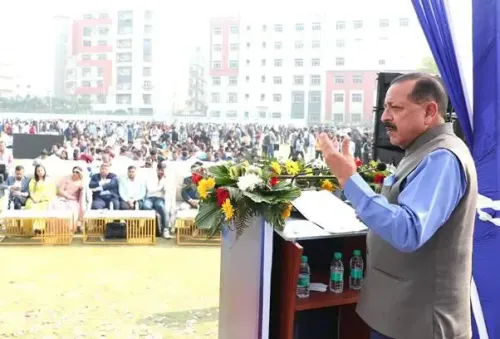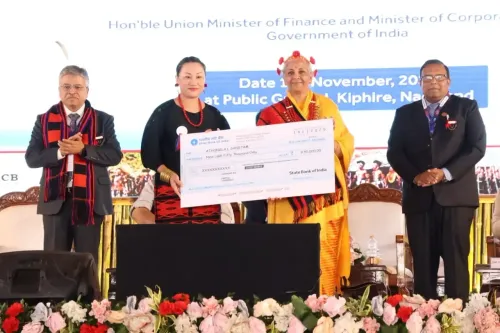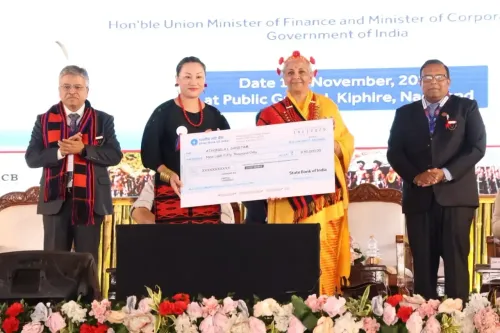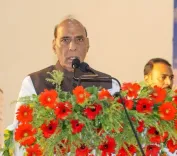What Insights Did Dr Montek Singh Ahluwalia Share at the Inaugural Dr Manmohan Singh Memorial Lecture?
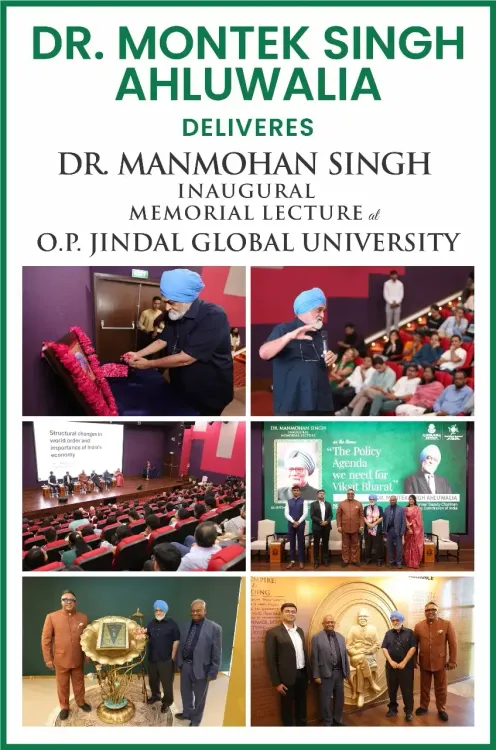
Synopsis
Key Takeaways
- Dr Ahluwalia's expertise in economic policy is crucial for understanding India's growth trajectory.
- The 1991 reforms led to significant changes in India's economic landscape.
- India must focus on legal and institutional reforms to enhance foreign investment.
- Comparisons with China reveal the urgency for accelerated growth.
- Political challenges will need to be navigated for sustainable economic advancement.
Sonipat, Sep 29 (NationPress) Dr Montek Singh Ahluwalia, the former Deputy Chairman of the Planning Commission of India, was the keynote speaker at the Inaugural Dr Manmohan Singh Memorial Lecture held at O.P. Jindal Global University. His lecture focused on the theme "The Policy Agenda We Need for Viksit Bharat".
Dr Ahluwalia provided a comprehensive analysis of the Indian economy and the pivotal decisions shaping it since the 1990s, reflecting on the past, present, and future.
Having served as Deputy Chairman from July 2004 to May 2014, Dr Ahluwalia has held numerous government roles and has been instrumental in India's economic reforms since the mid-1980s. He was honored with the Padma Vibhushan, India's second-highest civilian award, by the President of India in 2011 for his exceptional contributions to economic policy and public service.
Reflecting on the past, he stated, "We needed to take a comprehensive look at policy changes." He emphasized that the licensing system for imports was particularly burdensome for small and medium-sized enterprises, while larger businesses found it easier to navigate. He noted that the 1991 reforms were designed to eradicate such cumbersome systems, although he acknowledged that the gradual approach to reform had its drawbacks.
Despite the challenges, he pointed out that economic growth had improved, although not at the same scale as China. Dr Ahluwalia elaborated on the transformative changes and the policies necessary to drive India's growth in the upcoming decades.
He remarked, "The structural change in the world economy is very important. We are the fastest-growing emerging market economy." He noted that comparisons between India and China reveal a significant disparity in their economic standings today.
Dr Ahluwalia also analyzed the impressive growth of the Chinese economy relative to Western nations, highlighting that the United States currently holds 26.2% of global GDP, while the European Union has seen a decline from around 28% in the 1990s to approximately 17.4% today.
Looking ahead, he echoed the Prime Minister's mantra of "Reform, Perform, Transform", emphasizing that significant political challenges lie ahead if India is to achieve an average growth rate of 8% by 2047.
Dr Ahluwalia also called for reforms in legal frameworks and contract enforcement to attract foreign investment, which is crucial for India's growth.
In his welcoming remarks, Prof (Dr) C. Raj Kumar, Founding Vice Chancellor of O.P. Jindal Global University, highlighted the tradition of honoring influential figures through such lectures.
Dr Ahluwalia’s close collaboration with Prime Minister Dr Manmohan Singh has made him a distinguished policymaker with a profound understanding of public policy, characterized by his humility and commitment to dialogue.
Prof R. Sudarshan, Dean of the Jindal School of Government and Public Policy, noted the exceptional partnership between Dr Ahluwalia and Dr Manmohan Singh, combining rigorous scholarship with practical policy-making.
Reflecting on Dr Manmohan Singh's legacy, Prof (Dr) Mrinalini Jha remarked on his pivotal role in India's economic transformation as Finance Minister in 1991 and as Prime Minister from 2004 to 2014, where he forged key strategic partnerships and enacted landmark social policies.


